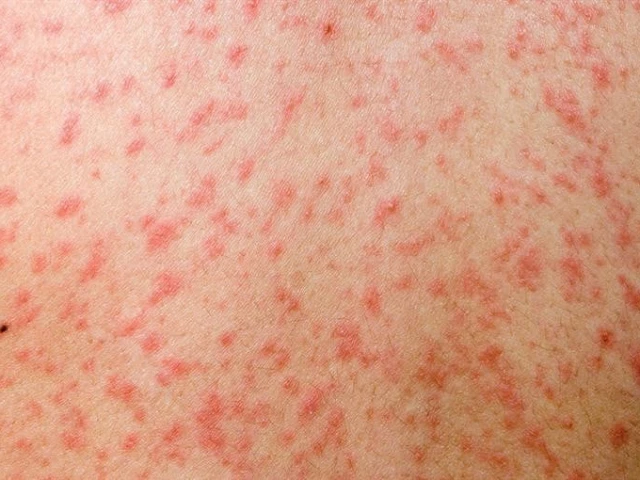Measles claims territory in District East
5 measles deaths have occurred in Karachi, all of which were reported from District East

The future of a nation relies heavily on the health and well-being of its children, who must be protected from childhood diseases through rigorous vaccination drives. Unfortunately, in Sindh, where routine immunization remains a challenge, diseases like measles continue to nip the buds of the country.
According to the Expanded Program on Immunization (EPI) of the Sindh Health Department, over 5,000 children have been brought with symptoms of measles across hospitals in Sindh, where 31 children have died between January and April 2025. Furthermore, across seven districts of Karachi, 2,242 children were brought to different hospitals with symptoms of measles, the presence of which was confirmed through a laboratory test in 948 children.
While speaking of the recent epidemic, Dr Raj Kumar, Project Director of the EPI at the Ministry of Health, confirmed that the outbreak was concentrated in District East, where out of 407 suspected cases, 247 children were confirmed to have measles. "Conversely, in the Central district, 476 children were brought with symptoms of measles, out of which 100 children were confirmed carriers. Five deaths occurred in Karachi, all of which were reported from District East," claimed Dr Kumar, while speaking of the area where no vaccination drive against measles has been conducted this year.
One such grieving parent was Amer Ali, father of 4-year-old Hasnain, who succumbed to measles. "My son was under treatment at a private hospital since the past 15 days. When his condition worsened, he was brought to the NICHD hospital, where he passed away. He had developed pneumonia along with measles, which caused him severe respiratory distress. Although we had administered both doses of the measles vaccine to our son, we still could not save his life," cried Ali.
Similarly, parents of another child brought to the emergency ward at Lyari Hospital revealed that their son had been experiencing fever and a rash on his body for several days. "When the child was brought to the emergency ward, the doctor informed that he had contracted measles. Our boy received medical treatment at the emergency ward, and luckily his condition has improved," said the parents.
According to Dr Waseem Jamalvi, President of the Pakistan Paediatric Association Sindh, even today many children in the province remain unvaccinated against measles. "If routine vaccination is ensured, the incidence of measles can be reduced. Parents are not getting their children vaccinated against measles. While some get the initial vaccinations, many miss out on the measles vaccine. The Health Department has a sufficient supply of the measles vaccine and has made it available at every EPI centre. Children who are not vaccinated against measles are more likely to contract the disease. Therefore, all parents are urged to get their children vaccinated against measles and complete the full course of protective vaccinations against 12 diseases," implored Dr Jamalvi.
Likewise, Dr Ikram Sultan, a health expert also attributed the rapid spread of measles to the low vaccination rate. "Measles is highly contagious, and despite vaccination, the number of children affected by measles is increasing. However, not vaccinating children against measles is a major reason behind the spread of this epidemic. Some affected children are those who were vaccinated, but due to weak immunity, they fell ill. Babies who are not breastfed or are suffering from nutritional deficiencies have weakened immunity and are at risk of acquiring measles. In Pakistan, children are administered measles vaccine at 9 and 15 months of age. If a child receives both doses of the vaccine, they can be effectively protected against measles," said Dr Sultan.
"The Health Department of Sindh will launch a special campaign in October, in which 8,226,945 children will be administered the measles vaccine. Under the EPI program, children are given two doses of the MMR vaccine to protect against measles, mumps, and rubella," announced Dr Kumar.



1724319076-0/Untitled-design-(5)1724319076-0-208x130.webp)















COMMENTS
Comments are moderated and generally will be posted if they are on-topic and not abusive.
For more information, please see our Comments FAQ